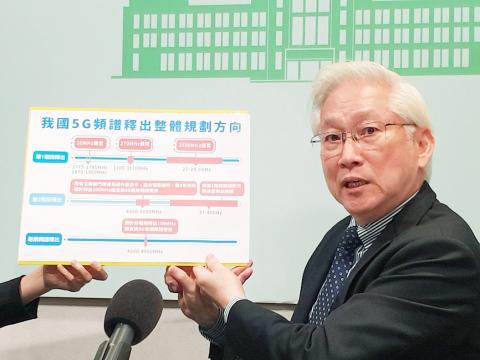The nation is to hold its first auction for the spectrum reserved for 5G services on Tuesday next week, the National Communications Commission (NCC) said yesterday, adding that a new mechanism would be used to accelerate the bidding process.
The nation’s five major telecoms — Chunghwa Telecom, Taiwan Mobile, Far Eastern Telecommunications, Asia-Pacific Telecom and Taiwan Star — have all qualified to participate in the auction, the commission said.
The commission has set the floor price at NT$30 billion (US$983.35 million), while the Executive Yuan has set a goal to receive NT$40 billion from the auction.

Photo: Lee Hsin-fang, Taipei Times
Lawmakers have forecast that the auction could generate at least NT$44 billion for the government.
The telecoms have expressed concern that that the longer the auction lasts, the higher the bids they would have to place, which would in turn would increase the costs of 5G services while they are still trying to offset the costs of 4G services.
Commission acting spokesman Hsiao Chi-hung (蕭祈宏) said that there is no way of forecasting how long the auction would last and whether the NT$44 billion goal could be reached.
Industry experts have estimated that the auction would last two weeks and generate about NT$40 billion.
Telecoms are to place a total of 10 bids every day in 20-minute intervals and they would indicate the spectrum width they require in each round, the commission said, adding that the firms would enter the next round of bidding when the amount of spectrum requested exceeds or equals the total amount of spectrum available.
The minimum bid increase would be set at 1.03 times the previous bid, it said.
The process is to continue until no bidders indicate their needs for additional spectrum in two consecutive rounds, it added.
The commission said that it has also created a mechanism to expedite the auction — the 51st and 101st bids are not allowed to request more spectrum than in the 50th and 100th bids respectively.
For example, if a firm’s 50th bid was for three frequency blocks in the 3.5 Gigahertz (GHz) band, the next bid could request no more than those three blocks.
This mechanism would motivate telecoms to focus on the spectrum they need and bid quickly, the commission said.
Meanwhile, the Executive Yuan yesterday said that it plans to reserve the frequency band between 4.8GHz and 4.9GHz for private corporations to conduct experiments of 5G applications, adding that fees would be charged for using the spectrum.
The plan is to be discussed at the weekly Cabinet meeting today, Minister Without Portfolio Wu Tsung-tsong (吳政忠) said, adding that private business owners could start filing applications once the plan has been approved.
Generally, it would take them one to two years to test the technology and decide whether it could translate into a viable business model, Wu said.
The government would release about 200MHz near the 3.5GHz frequency band for companies that have succeeded in developing a viable 5G commercial model, Wu added.

Alain Robert, known as the "French Spider-Man," praised Alex Honnold as exceptionally well-prepared after the US climber completed a free solo ascent of Taipei 101 yesterday. Robert said Honnold's ascent of the 508m-tall skyscraper in just more than one-and-a-half hours without using safety ropes or equipment was a remarkable achievement. "This is my life," he said in an interview conducted in French, adding that he liked the feeling of being "on the edge of danger." The 63-year-old Frenchman climbed Taipei 101 using ropes in December 2004, taking about four hours to reach the top. On a one-to-10 scale of difficulty, Robert said Taipei 101

A preclearance service to facilitate entry for people traveling to select airports in Japan would be available from Thursday next week to Feb. 25 at Taiwan Taoyuan International Airport, Taoyuan International Airport Corp (TIAC) said on Tuesday. The service was first made available to Taiwanese travelers throughout the winter vacation of 2024 and during the Lunar New Year holiday. In addition to flights to the Japanese cities of Hakodate, Asahikawa, Akita, Sendai, Niigata, Okayama, Takamatsu, Kumamoto and Kagoshima, the service would be available to travelers to Kobe and Oita. The service can be accessed by passengers of 15 flight routes operated by

Taiwanese and US defense groups are collaborating to introduce deployable, semi-autonomous manufacturing systems for drones and components in a boost to the nation’s supply chain resilience. Taiwan’s G-Tech Optroelectronics Corp subsidiary GTOC and the US’ Aerkomm Inc on Friday announced an agreement with fellow US-based Firestorm Lab to adopt the latter’s xCell, a technology featuring 3D printers fitted in 6.1m container units. The systems enable aerial platforms and parts to be produced in high volumes from dispersed nodes capable of rapid redeployment, to minimize the risk of enemy strikes and to meet field requirements, they said. Firestorm chief technology officer Ian Muceus said

MORE FALL: An investigation into one of Xi’s key cronies, part of a broader ‘anti-corruption’ drive, indicates that he might have a deep distrust in the military, an expert said China’s latest military purge underscores systemic risks in its shift from collective leadership to sole rule under Chinese President Xi Jinping (習近平), and could disrupt its chain of command and military capabilities, a national security official said yesterday. If decisionmaking within the Chinese Communist Party has become “irrational” under one-man rule, the Taiwan Strait and the regional situation must be approached with extreme caution, given unforeseen risks, they added. The anonymous official made the remarks as China’s Central Military Commission Vice Chairman Zhang Youxia (張又俠) and Joint Staff Department Chief of Staff Liu Zhenli (劉振立) were reportedly being investigated for suspected “serious